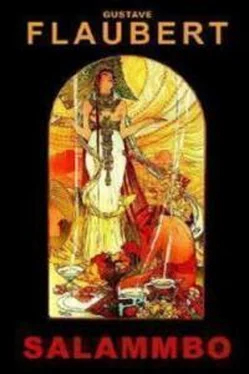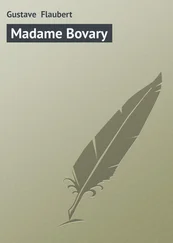The shape of the camps could be recognised by their sloping palisades. A long heap of black cinders was smoking on the side of the Libyans; the devastated soil showed undulations like the sea, and the tents with their tattered canvas looked like dim ships half lost in the breakers. Cuirasses, forks, clarions, pieces of wood, iron and brass, corn, straw, and garments were scattered about among the corpses; here and there a phalarica on the point of extinction burned against a heap of baggage; in some places the earth was hidden with shields; horses' carcasses succeeded one another like a series of hillocks; legs, sandals, arms, and coats of mail were to be seen, with heads held in their helmets by the chin–pieces and rolling about like balls; heads of hair were hanging on the thorns; elephants were lying with their towers in pools of blood, with entrails exposed, and gasping. The foot trod on slimy things, and there were swamps of mud although no rain had fallen.
This confusion of dead bodies covered the whole mountain from top to bottom.
Those who survived stirred as little as the dead. Squatting in unequal groups they looked at one another scared and without speaking.
The lake of Hippo–Zarytus shone at the end of a long meadow beneath the setting sun. To the right an agglomeration of white houses extended beyond a girdle of walls; then the sea spread out indefinitely; and the Barbarians, with their chins in their hands, sighed as they thought of their native lands. A cloud of grey dust was falling.
The evening wind blew; then every breast dilated, and as the freshness increased, the vermin might be seen to forsake the dead, who were colder now, and to run over the hot sand. Crows, looking towards the dying, rested motionless on the tops of the big stones.
When night had fallen yellow–haired dogs, those unclean beasts which followed the armies, came quite softly into the midst of the Barbarians. At first they licked the clots of blood on the still tepid stumps; and soon they began to devour the corpses, biting into the stomachs first of all.
The fugitives reappeared one by one like shadows; the women also ventured to return, for there were still some of them left, especially among the Libyans, in spite of the dreadful massacre of them by the Numidians.
Some took ropes' ends and lighted them to use as torches. Others held crossed pikes. The corpses were placed upon these and were conveyed apart.
They were found lying stretched in long lines, on their backs, with their mouths open, and their lances beside them; or else they were piled up pell–mell so that it was often necessary to dig out a whole heap in order to discover those they were wanting. Then the torch would be passed slowly over their faces. They had received complicated wounds from hideous weapons. Greenish strips hung from their foreheads; they were cut in pieces, crushed to the marrow, blue from strangulation, or broadly cleft by the elephants' ivory. Although they had died at almost the same time there existed differences between their various states of corruption. The men of the North were puffed up with livid swellings, while the more nervous Africans looked as though they had been smoked, and were already drying up. The Mercenaries might be recognised by the tattooing on their hands: the old soldiers of Antiochus displayed a sparrow–hawk; those who had served in Egypt, the head of the cynosephalus; those who had served with the princes of Asia, a hatchet, a pomegranate, or a hammer; those who had served in the Greek republics, the side–view of a citadel or the name of an archon; and some were to be seen whose arms were entirely covered with these multiplied symbols, which mingled with their scars and their recent wounds.
Four great funeral piles were erected for the men of Latin race, the Samnites, Etruscans, Campanians, and Bruttians.
The Greeks dug pits with the points of their swords. The Spartans removed their red cloaks and wrapped them round the dead; the Athenians laid them out with their faces towards the rising sun; the Cantabrians buried them beneath a heap of pebbles; the Nasamonians bent them double with ox–leather thongs, and the Garamantians went and interred them on the shore so that they might be perpetually washed by the waves. But the Latins were grieved that they could not collect the ashes in urns; the Nomads regretted the heat of the sands in which bodies were mummified, and the Celts, the three rude stones beneath a rainy sky at the end of an islet–covered gulf.
Vociferations arose, followed by the lengthened silence. This was to oblige the souls to return. Then the shouting was resumed persistently at regular intervals.
They made excuses to the dead for their inability to honour them as the rites prescribed: for, owing to this deprivation, they would pass for infinite periods through all kinds of chances and metamorphoses; they questioned them and asked them what they desired; others loaded them with abuse for having allowed themselves to be conquered.
The bloodless faces lying back here and there on wrecks of armour showed pale in the light of the great funeral–pile; tears provoked tears, the sobs became shriller, the recognitions and embracings more frantic. Women stretched themselves on the corpses, mouth to mouth and brow to brow; it was necessary to beat them in order to make them withdraw when the earth was being thrown in. They blackened their cheeks; they cut off their hair; they drew their own blood and poured it into the pits; they gashed themselves in imitation of the wounds that disfigured the dead. Roarings burst forth through the crashings of the cymbals. Some snatched off their amulets and spat upon them. The dying rolled in the bloody mire biting their mutilated fists in their rage; and forty–three Samnites, quite a "sacred spring," cut one another's throats like gladiators. Soon wood for the funeral–piles failed, the flames were extinguished, every spot was occupied; and weary from shouting, weakened, tottering, they fell asleep close to their dead brethren, those who still clung to life full of anxieties, and the others desiring never to wake again.
In the greyness of the dawn some soldiers appeared on the outskirts of the Barbarians, and filed past with their helmets raised on the points of their pikes; they saluted the Mercenaries and asked them whether they had no messages to send to their native lands.
Others approached, and the Barbarians recognised some of their former companions.
The Suffet had proposed to all the captives that they should serve in his troops. Several had fearlessly refused; and quite resolved neither to support them nor to abandon them to the Great Council, he had sent them away with injunctions to fight no more against Carthage. As to those who had been rendered docile by the fear of tortures, they had been furnished with the weapons taken from the enemy; and they were now presenting themselves to the vanquished, not so much in order to seduce them as out of an impulse of pride and curiosity.
At first they told of the good treatment which they had received from the Suffet; the Barbarians listened to them with jealousy although they despised them. Then at the first words of reproach the cowards fell into a passion; they showed them from a distance their own swords and cuirasses and invited them with abuse to come and take them. The Barbarians picked up flints; all took to flight; and nothing more could be seen on the summit of the mountain except the lance–points projecting above the edge of the palisades.
Then the Barbarians were overwhelmed with a grief that was heavier than the humiliation of the defeat. They thought of the emptiness of their courage, and they stood with their eyes fixed and grinding their teeth.
The same thought came to them all. They rushed tumultuously upon the Carthaginian prisoners. It chanced that the Suffet's soldiers had been unable to discover them, and as he had withdrawn from the field of battle they were still in the deep pit.
Читать дальше









![Гюстав Флобер - Закат Карфагена [Сборник]](/books/414440/gyustav-flober-zakat-karfagena-sbornik-thumb.webp)
